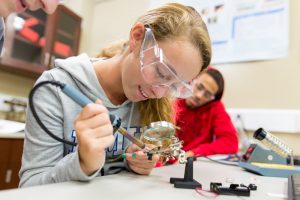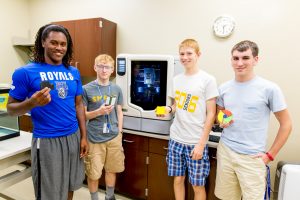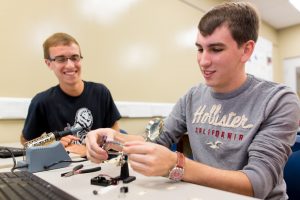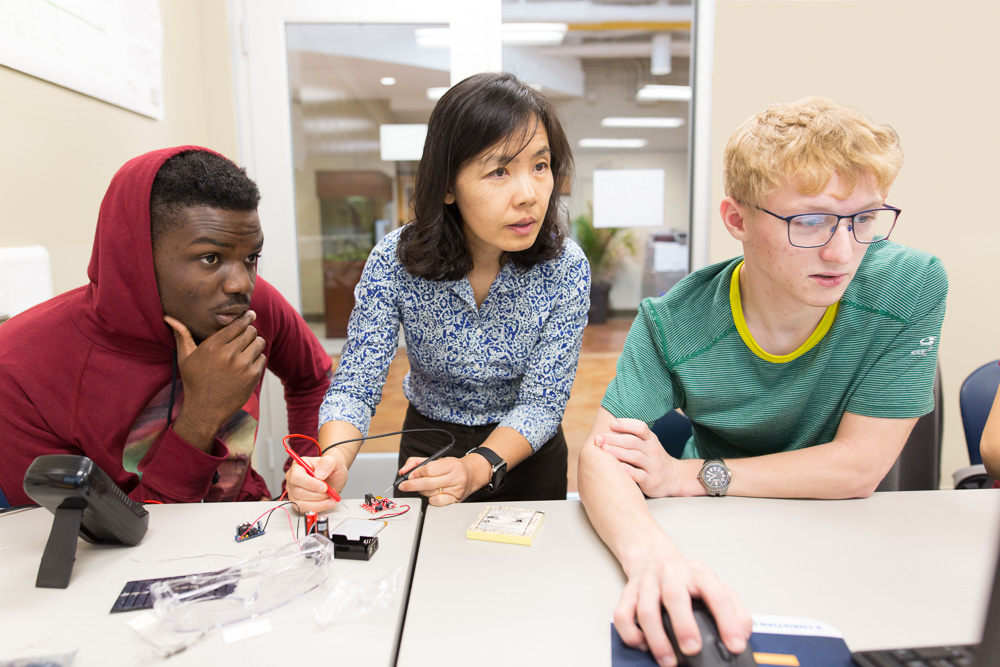Soldering is an elementary skill, but Enock Samalenge has it down. With a steady and sure hand, the Eastern Mennonite University first-year student from the Democratic Republic of the Congo had guided his introductory engineering group to a speedy completion of their project’s first stage.
“See how round and even they are,” engineering professor Esther Tian points to the beads connecting electronic components in a very small circuit board. “Very good.”
Within minutes, Samalenge and his group have checked their work by connecting a battery-powered charger to his cell phone. Then they are off on the next step, trying to figure out—with no directions supplied— how to connect a small solar panel to finish the project.

The energetic hum in Tian’s “Introduction to Engineering and Design” class is the intellectual sound of EMU’s new engineering program, literally. Eleven charter members of EMU’s new four-year engineering program are in the class.
Five other students, Tian said with a smile, were either contemplating changing their major or adding a double major (of the two concentrations offered, computer engineering syncs more efficiently with the computer science major; mechanical engineering is more difficult to add as a double major). And a sixth, senior Aron Harder, enrolled in the course to supplement his computer science coursework.
The project is one of several on the syllabus designed to give students the basics of engineering design through the development of an increasingly sophisticated skillset. The culminating project involves designing parts with Autodesk Inventor, building electronic circuits and programming an Arduino board, with students selecting from among five project options or creating their own proposal.

“Understanding and utilizing engineering design is a foundational skill,” Tian says. “In this project, they first get a lot of help with step-by-step instructions in the first stage and then we take away some of that help and ask them to find out the missing information they need to finish the project.”
Reflecting on his learning since August, first-year engineering major James Paetkau says the project-based course has helped him learn more about and value cooperation. Experimentation, too, is important: “Even if you don’t always have the answer, if you are willing to experiment, fail and persist, the answer is almost always achievable.”
Paetku’s end goal, he says, is to “find a profession in engineering which allows me to have a positive impact on the lives of other people.” Biomedical or civil engineering are appealing for this reason. He’s also intrigued by the potential of biomimicry, “which uses designs inspired by nature to offer alternative, often sustainable, answers to design problems.”
Paetku says the intro course has already helped him acquire skills with design software Autodesk Inventor, increasing his creative capacities. “I have been able to learn an incredible amount just by having a design idea in my head, and by messing around with Autodesk until I can create the design. It’s been really fun to be able to draw up our own designs and being able to print them with our 3-D printer.”

The 3-D printer has been an “enjoyable” tool for first-year Austin Engle, who plans a career in computer engineering. Though he graduated from Harrisonburg High School’s STEM Academy, where he first learned and practiced the design process, he says he had little experience with 3-D printing. That academic preparation, however, has made the transition to college engineering coursework more smooth, in terms of both foundational skills and creativity, what he calls “the strength to think outside the box.”
“I have been a part of a lot of brainstorming sessions, which lead me to hear lots and lots of crazy ideas, many of which, when applied correctly, are actually beneficial,” he said.
With some skills already in the bag, Engle says some of his biggest lessons have been more logistical: “Deadlines here are set in stone and that has led to some frantic endings of the projects,” he says with wry humor.
With several more projects to go in his first college-level engineering class, that skill, no doubt, will improve by the time he graduates in 2020 among the first EMU-trained engineers.

Awesome! EMU gave me a great foundation for my engineering career. I wish I could have finished it there. So glad to see this program growing.
Congrats to the creators of this course at EMU! I especially admire the teaching philosophy of this course – encouraging to try new things, brainstorming etc. It is the best way for students to gain confidence in themselves and their ideas.